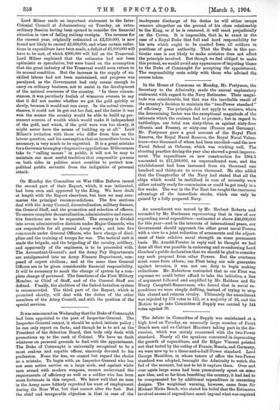On Monday the Committee on War Office Reform issued the
second part of their Report, which, it was intimated, had been seen and approved by the King. We have dealt at length with the Report elsewhere, but here we may sum- marise the principal recommendations. The five sections deal with the Army Council, decentralisation, military finance, the General Staff, and the promotion and selection of officers. To ensure complete decentralisation, administrative and execu- tive functions are to be separated. The country is divided into seven administrative districts under Major-Generals, who are responsible for all general Army work ; and into five commands under General Officers, who have charge of disci- pline 4nd the training of troops for war. The tactical unit is made the brigade, and the brigading of the cavalry, artillery, and apparently of the engineers, is to be proceeded with. The Accountant-General's and the Army Pay Departments are amalgamated into an Army Finance Department, cow-
of expert civilians ; and at the same time General Officers are to be given considerable financial responsibility. It will be necessary to mark the change of system by a com- plete change of personnel. The functions of the First Military Member, as Chief of Staff, and of the General Staff are defined. Finally, the abolition of the linked-battalion system is recommended. The third part of the Report, which is promised shortly, will deal with the duties of the other members of the Army Council, and with the position of the special services.










































 Previous page
Previous page